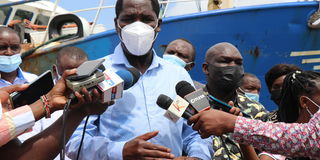Kenya will not ban fish imports from China, CS Munya says

Agriculture, Livestock, and Fisheries Cabinet Secretary Peter Munya briefing the press in Mombasa on the status of the fisheries sector in the Indian Ocean. He said the government pay the Sh16 million debt, subscription fees for Indian Ocean surveillance as he admitted the existence of foreign vessels fishing in the Kenyan exclusive economic zones
Kenya will not ban fish imports from China, because there is a severe shortage facing the country, the government has said.
Agriculture Cabinet Secretary Peter Munya said Kenya has insufficient stocks, with local fish fetching higher prices than imported ones.
“The challenge we have in the country is insufficient local fish to satisfy the market and hence you cannot ban imports that fill that gap that we are facing. You only ban when you raise the capacity to produce locally,” he said.
Because of the shortage, he said, the government has been building capacity for aquaculture, mariculture and fish farming.
“In the meantime, and until we deal with that…Kenyans will continue importing fish. Even the local fish is very expensive, you go to the restaurants… why? Because there is a big shortage. We urge people to invest in this sector. It’s an opportunity for people to do fish farming.”
Statistics from the Kenya Marine and Fisheries Research Institute show that there is a deficit of about 400,000 metric tonnes of fish.
Kenya’s annual fish production stands at 160,000 metric tonnes against the potential of 300,000.
Mr Munya said it is illogical to recommend a ban without providing a solution to the deficit.
“But perhaps it’s a concern that the National Assembly’s Committee on Agriculture has…that we are importing fish when we should be producing locally,” he said.
“We must direct more resources to this sector and build our own local fish production so that we don’t rely on imports.”
Last week, the Agriculture Committee said Kenya would ban fish imports from China because enough stocks are available in its lakes, rivers and the ocean.
Chairperson Silas Tiren (Moiben) assured Kenyans that lawmakers will do their part to improve fisheries and protect the sector from international incursions.
“I don’t see why we should import from China when we have enough fish in the country. There is a lot of potential in our waters, we must capture it,” he said.
“It’s clear that foreign countries are fishing from our waters and later selling to us, which shows we have enough fish and potential.”
The MPs and fisheries officials, who were on a fact-finding mission on the plight of fishermen in the Coast region, said they want to help the country to harness the sector’s potential and create job and business opportunities.
Adan Haji (Mandera South) said MPs will come up with legislation banning fish imports because Kenya has enough stock.
In 2019, Kenya’s total annual fish production stood at 146,687 metric tonnes (MT), comprising 23,700MT from marine resources, 18,542 from aquaculture, and 102,331 from freshwater production.
Mr Munya said Kenya’s deep waters are being exploited by foreign industrial fishing vessels because local fishermen cannot work in those waters.
But he said the government is training its youth to venture into deep sea fishing and work on international vessels in the country’s exclusive economic zones.
Artisanal fishermen, he said, have limited fishing technology for semi-industrial and industrial fisheries in deep waters.
But Wavuvi Association of Kenya chairman Hamidi Omar supported a ban though he urged the State to empower local fishers by providing them with modern equipment to increase production.
“A kilogram of tilapia from China is sold for Sh250 while the same fish from Lake Victoria goes for Sh500. Our fish is very expensive because we lack the facilities to increase production,” he said.
Though Kenya has enough stock in Lake Victoria and the Indian Ocean, he said, fishermen lack modern boats and fishing gear.
This story is part of a Nation.Africa reporting series on the state of the fishing sector at the Coast region. Also read:





